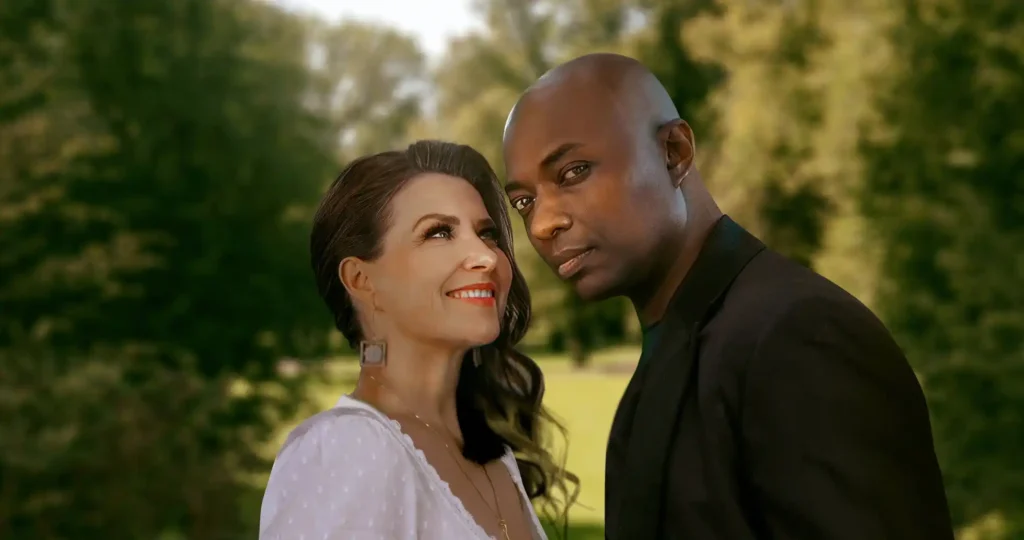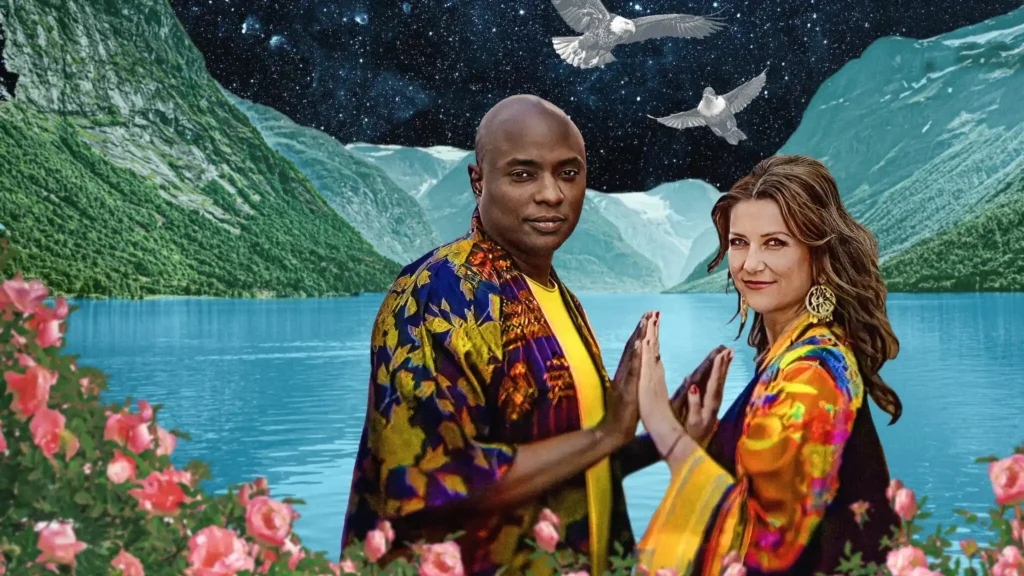
You always run a bit of a risk laughing at something like Rebel Royals: An Unlikely Love Story. It touches on subjects that are very serious, including abhorrent racism, health issues, and a sad stretch about suicide. And there’s always a chance that the unlikely romance at its centre might be genuine, and its subjects might be earnestly and sincerely in love. But I can only work with what I’ve got, and when you present me with a “soul-sexual” shaman who claimed medallions could cure Covid-19 and married a Norwegian princess who herself believes she has psychic powers, I’m pretty much guaranteed to see the funny side.
I think we’re supposed to, at least for the most part. The documentary film, which is directed by Tiger King’s Rebecca Chaiklin and is similarly streaming on Netflix, leans heavily into the absurdity of some of the claims being made and the reality-TV gloss of picky wedding planning, exuberant outfit choices, and a general flamboyant fish-out-of-water sensibility that is explicitly played for laughs. But it’s also sadly reluctant to really explore any of the shadier implications or accusations on the story’s periphery. It doesn’t make its subjects the butt of the joke as determinedly as Untold: The Liver King did, and it’s far removed from some of the streaming platform’s more searing documentary fare, like Grenfell: Uncovered or Apocalypse in the Tropics. Instead, it feels more like a carefully curated puff piece, not dissimilar from WWE: Unreal, full of gushing praise and happy-clappy idealism that deliberately ignores all the spikier angles that would have been significantly more interesting than what is, essentially, a gossip magazine that takes 90 minutes to be read aloud.
On the surface, Durek Verrett and Norway’s Princess Märtha Louise seem an unlikely couple. He’s a Black American sixth-generation shaman who everyone – including himself – believed to be gay, and she’s… well, a princess. Part of the overall arc of Rebel Royals is trying to convince us that they had much more in common than anyone realised, but what they have in common – stuff like magical powers and facilities for woo-woo nonsense like “energy” and astrology – seems to be garbage. The implication, though it’s not one that the film seems very interested in making with conviction, is that what they both really share is a desire for attention.

You can always tell a documentary is on the softer side when the subjects who stand to most benefit from it crop up most frequently as the talking heads (think of Shark Whisperer). There are some other viewpoints offered, but none with any real sincerity. Märtha Louise and Verrett, and sometimes the former’s children from her previous marriage to Ari Behn, tell their own story from their own perspective. This is perhaps why so many of the fractious elements are left unaddressed. Everyone expresses obvious confusion about Verrett’s sexuality, but nobody dares say that he might have invented the “soul-sexual” moniker to justify a relationship with a woman of suitable station (later, there’s a bit of a scandal with Verrett sharing details of his and Märtha’s sex life that boils down, essentially, to them having sex all the time but him never being able to ejaculate, which you’d think might support this reading, but it never comes up again). A royal expert suggests that Verrett might be a scam artist, but the idea of him actually being a scam artist is never meaningfully engaged with, aside from in a few blink-and-you’ll-miss-it cameos for alarmist tabloid headlines. Improbably, nobody mentions Rasputin, not even once.

Rebel Royals: An Unlikely Love Story Key Art | Image via Netflix
Some stuff is difficult to argue with. Upon Märtha Louise and Verrett going public with their relationship in 2019 and Verrett’s arrival in Norway, he was subject to horrific racist abuse online and in the press, the idea of a lily-white country’s royal bloodline being “muddied” evidently of more concern than the nation’s sweetheart having been potentially brainwashed by a conman, whatever the colour of his skin might be. To be fair, I never really got the sense that Märtha was brainwashed, since she seemed to have drunk the spiritual healing Kool-Aid way before she met Verrett, but you know what I mean.
Verrett frames any criticism he faces as a deliberate smear campaign by people upset about his being Black and bisexual, and Rebel Royals: An Unlikely Love Story follows suit. The vile racist abuse and calculated indifference from his future in-laws – the similarities to Prince Harry and Meghan Markle’s very public race-related spat with the British royal family are so striking that Harry himself publicly endorses Märtha’s father, King Harald, when he eventually speaks out about the press’s treatment of Verrett – forms a convenient smokescreen for all of the other controversies Verrett was involved in. These include, but are not limited to, selling extortionately priced healing amulets during the height of the COVID pandemic and sucking off a client during a “healing” session. The latter is particularly strange, since the film deploys a leaked voice note of Verrett himself admitting to having crossed this line, but then nobody ever asks him about it. It might as well not have been included at all.
Occasionally, Rebel Royals shifts into much more serious territory. The suicide of Märtha Louise’s ex-husband and the emotional impact that had on her and their three daughters is no laughing matter, and Verrett’s own health issues become a recurring theme. Despite a life-saving kidney transplant from an older sister earlier in his life, he nonetheless requires another transplant to prevent the regular dialysis that he must currently undergo. Call me insensitive if you like, but I can’t help but feel that the film misses an open goal here in not asking Verrett how the very shamanic healing he makes a fortune from selling somehow doesn’t apply to his own kidneys. Somebody lambasting modern medicine while simultaneously being kept alive by it deserves, I think, a question or two on the subject.
But this isn’t that documentary. Instead, it’s much more interested in casting Verrett as a charming, flamboyant eccentric, and his marriage to Märtha Louise as a misunderstood but extremely earnest love story. I’m sceptical, but then again I always am. If they’re happy, fair play to them. But one must consider the possibility that if they’re as satisfied as they claim, neither they nor we needed a documentary to convince us of it.


